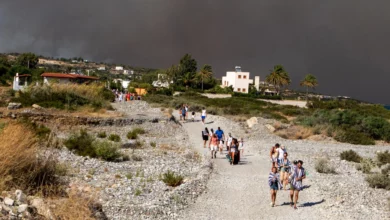
Fearing for their safety in Tunisia after a gunman killed dozens of tourists, sun-seeking Europeans are switching to destinations such as Spain, Bulgaria or even Greece for holidays this year.
Tunisia's tourism industry had been recovering after the Arab Spring unrest, and had become a popular lower-cost beach holiday spot for Europeans. Last year, 2.8 million travelled there, rebounding back towards 3.8 million level seen in 2010 before the uprising, according to official statistics.
But last week's attack – in which 38 people were killed by an Islamist gunman at a beach hotel, mostly Britons – added to security fears raised after a massacre at the Bardo museum in March, when two gunmen opened fire on tourists.
Now many tourists who had planned or booked Tunisian trips are looking elsewhere.
Long-haul destinations are unlikely to pick up tourists originally destined for Tunisia, said travel analyst Angelo Rossini from market research firm Euromonitor. Destinations like the Maldives, the Caribbean and Mexico are typically more pricey and target a different customer segment.
Instead the biggest beneficiary is expected to be Spain, Rossini added. Spain targets a similar type of tourist to Tunisia – those seeking a value-for-money all-inclusive holiday.
However, those switching may have to pay a premium as the holiday season is already under way and people typically book months in advance.
"It's clear that some tourists will now change Tunisia for continental Spain or the Canary Islands, but they will have to pay more," said Juan Molas, chairman of the Spanish Hotel Federation Cehat.
Molas also said Bulgaria and Turkey, which have lost a lot of their customers from Russia due to the economic crisis there, could prove to be popular, good-value alternatives to Spain.
However some industry experts said Westerners staying away from Tunisia for security reasons may be unwilling to switch to countries such as Turkey, which borders war-torn Syria, and Egypt, where there has been social and political unrest in recent years.
"After the incident in Tunisia, Turkey, as a Muslim nation, may be even more negatively impacted, because all of these types of events keep occurring in Muslim nations," said Timur Bayindir, head of the Touristic Hotels & Investors Association (TUROB) in Turkey.
With its hot weather and good-value package tours, Greece could also be a beneficiary of a tourism switch but a lot depends on this weekend's referendum on the country's bailout terms and the outcome of the debt crisis, said Bob Atkinson, a travel expert at price comparison website TravelSupermarket.
REFUNDS, DISCOUNTS
The biggest groups of European tourists to Tunisia come from France, Britain and Germany.
Of the 38 killed last Friday, 30 were British customers of tour operators Thomson and First Choice, part of Europe's largest travel group TUI . A minute's silence was held by millions across Britain on Friday.
Even though no official UK travel warning for the resorts has been issued, Thomson and First Choice have brought back almost 6,000 tourists from Tunisia on 40 flights over the last week. They have cancelled all holidays to Tunisia until July 9 and are offering to switch to alternative holidays free of charge or full refunds for those wishing to cancel.
For those with holidays departing later this summer, the company has waived fees to change, and is offering discounts on an extra 15 flights until the end of October to destinations in Spain, Bulgaria, Cyprus and Greece.
Rival Thomas Cook too has brought guests back early and is offering free changes to those booked on holidays due to depart before July 12. For those travelling later it is waiving fees and has added capacity in Spain, Portugal, Bulgaria and Turkey.
The tour operators are facing a hit to their margins because they are now having to source rooms at higher cost in alternative destinations. TUI and Thomas Cook shares have dropped 6 to 8 percent this week.
Around 10,000 British holidaymakers remain in Tunisia, about half the number a week ago, British travel association ABTA said.
Meanwhile, about 100,000 French tourists had booked for July holidays in Tunisia and so far 75 percent have decided to cancel their trips, with the bulk choosing an alternative destination, said Jean-Pierre Mas, chairman of French travel agency federation SNAV.
"The impact is very strong. The summer season is lost (for Tunisia)," he said, adding that Greece, Croatia, Cyprus, Spain and Sicily were popular alternatives.
Tunisia is also a popular winter sun destination, with Credit Suisse estimating it accounts for around 3 percent of tour operator passenger volumes in both the summer and winter.
Thomas Cook and TUI have so far not made changes to their winter programmes, with TUI saying it was too early.
Euromonitor's Rossini predicted tourism to Tunisia could be affected for at least two years.
Increased security presence may do little to help either, said Volker Boettcher, a professor of tourism management at Harz University in Germany.
"Imagine you're sitting on the beach watching security staff patrolling with guns. That's not a relaxed, carefree holiday."




